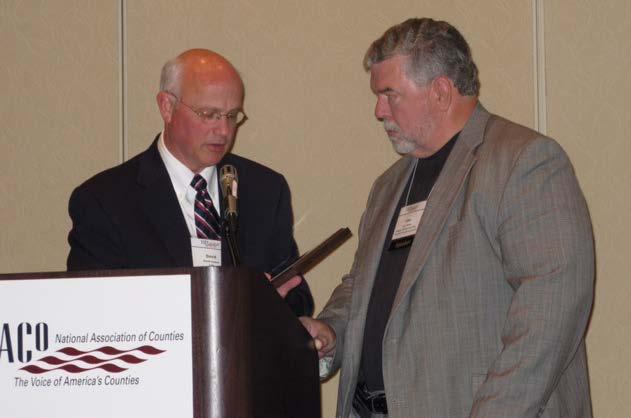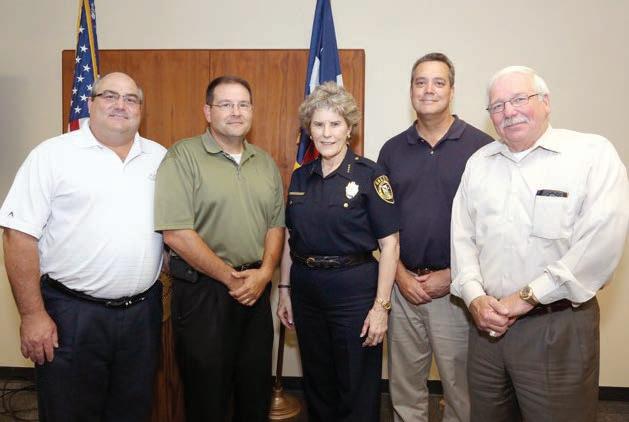
7 minute read
Research Corner
Effective county executives share commitment to training, mentoring
It is often said that effective local officials and employees demonstrate leadership and commitment to their community. Their jobs are often thankless, yet hundreds of county officials and county employees commit to serve their communities each year. However, effective public service requires even more — effective public servants demonstrate a continuous drive for learning. As was said by Benjamin Franklin: “An investment in knowledge pays the best interest.”
I’ve witnessed first hand the formidable task placed upon each county elective office. Even a spouse may not fully appreciate the scope to which county officials are charged to know the body of laws imposed upon them. They must have a working knowledge of the various laws setting forth their affirmative duties to execute. Additionally, they must be mindful of the ever-increasing body of laws and regulations that constrain them. The voluminous Arkansas County Compliance Guide issued by the AAC and the procedural guide AAC issues for each county office demonstrate the scope of laws. In contrast, cities are not a subdivision of the state and city officials are not generally directed to perform duties on behalf of the state. Arkansans are truly blessed with many county officials and employees that possess a drive to assimilate a mountain of information and establish depth of understanding. They work to become familiar with new laws as they come into effect, and they make frequent use of the AAC procedural guide, the Arkansas Compliance Guide and procedural guides.
Many of the county executives that have excelled also participate in the meetings of their affiliate organizations. Those that do not attend the meetings of the affiliate organizations may not realize what they are missing. Brenda “Emmy” Emerson, AAC’s ARcounties Continuing Education Program Coordinator, has taken the education of our affiliate organizations to a higher level. The meetings offer good information and access to colleagues to help you along the way. Each association now offers more training/ mentoring than ever for incoming newly elected county officials in the new elect schools. Our affiliate organizations make good use of e-mail list serves. Many of our county officials find serving their communities rewarding, and they are equally generous in mentoring their fellow county officials. The process of mentoring benefits the teacher as well as the student.
Participating in the legislative efforts of your affiliate organization can be an important part of serving your community. Through the affiliate organizations, our county officials and AAC staff make collective beneficial use of their depth of knowledge in shaping policy and legislation. We have championed scores of improvements in the law. This team effort requires knowing the law and how to make
RESEARCH CORNER
the law better. Our working knowledge of the law and firsthand knowledge of the needs of the community are beneficial to state officials.
The Hon. Mike Jacobs served Johnson County as county judge for 24 years, served as president of the AAC Board of Directors for 15 years and is now serving Mark Whitmore his community as justice of the AAC Chief Counsel peace. By all accounts Judge Jacobs was an exceptionally effective county executive. He demonstrated the traits of a leader, a commitment to his community and a commitment for learning and improving the laws. In a word, he “engaged.” Judge Jacobs engaged at the state Capitol in support of the County Judges Association of Arkansas (CJAA) and AAC legislation. He engaged at the U.S. Capitol in Washington, D.C. He visited with the Arkansas Congressional delegation on federal legislation and funding such as Payment in Lieu of Taxes (P.I.L.T.) and highway funding. He even testified before a Congressional committee on Secure Rural Schools funding. Judge Jacobs religiously attended National Association of Counties (NACo) annual and legislative conferences, and he served on NACo committees. The judge explained, “Participation in NACo helped me to find out what was going on in counties in other states and to try to get ahead of the curve. Also, NACo has many services that were useful for my county and other counties in Arkansas.”
The Hon. Mary Lou Slinkard served Benton County as county clerk for 28 years, state representative for six years and is currently serving as Benton County justice of the peace. While county clerk, she regularly attended NACo and Election
Notice: The upcoming 2016 edition of the Arkansas Compliance Guide will have a new feature. Each edition will include three access codes so that a copy of the laws in the compliance guide may be accessed and searched digitally. These tools and a working knowledge of the law are important to effective service. Contact Whitney Barket at wbarket@arcounties.org or at (501) 372-7550 to pre-order your 2016 Arkansas County Compliance Guide or for more information. Cost is $70, which includes tax and postage.



Left: Sebastian County Judge David Hudson, chairman of the National Association of Counties’ Justice and Public Safety Committee, recognizes Leon Evans, chief executive officer of The Center for Health Care Services in San Antonio, for his efforts in reducing the number of mentally ill incarcerated in Bexar County, Texas, jails. Right: AAC Chief Counsel Mark Whitmore, Crawford County Sheriff Ron Brown, Sebastian County Sheriff Bill Hollenbeck and Arkansas Sheriffs Association Executive Director Ronnie Baldwin are pictured with Bexar County, Texas, Sheriff Susan Pamerleau. The Arkansas contingent toured Bexar County Jail in San Antonio, a model for reducing jail and prison overcrowding.
Center meetings as well as annual conventions of International Association of Clerks, Recorders, Election Officials and Treasurers (IACREOT). She says the meetings on voting laws and systems standards, along with collaboration with other election officials, provided her a depth of knowledge about voting laws and voting equipment. Rep. Slinkard says, “Bringing back information from IACREOT, NACo and Election Center conventions substantially assisted my job performance and community. Also, I shared this information with other county clerks, election coordinators and state officials and employees in Arkansas.”
The Arkansas Sheriffs Association (ASA) knows well the fruits that can be produced from attending the annual convention of the National Sheriffs Association (NSA). The NSA conducts substantive seminars on law enforcement and detention topics ranging from the use of body cameras to prevention of suicides in jails. Section 14 of the Criminal Justice Reform Act, SB 692 of 2015, Act 895 of 2015, placed a cap for inmate medical expenses at Medicaid — the agreed government rate for medical care. If Sandy Horton, director of the Kansas Sheriffs Association, had not attended the annual conferences of the NSA and collaborated with Ronnie Baldwin, director of the ASA, the sheriffs, county judges and legislators in Arkansas would not even know to seek this important common-sense cap. The ASA now pays for the registration, lodging and some meals of one sheriff from a Class 1 or 2 county who attends the annual convention of the NSA. Woodruff County Sheriff Phil Reynolds was the fortunate recipient this summer for the NSA convention in Baltimore. Sheriff Reynolds reports he gained valuable insights from discussions with sheriffs nationwide from counties large and small. He said, “It was an eye opening experience, and I realize that more than likely the problem I am facing has been shared by other sheriffs in Arkansas or nationwide. There are other sheriffs to contact to draw from their experience.”
There is no greater priority to county or state government than the unprecedented and continued jail and overcrowding crisis. This in part relates to diversion of the mentally ill from county jails and the criminal justice system when appropriate. These topics have been the focus of many NACo and NSA conventions in recent years. These meetings have highlighted nationally acclaimed successes in addressing prison and jail overcrowding. In particular, the programs of Bexar County, Texas, have been recognized as evidence-based ways of effectively combating behavioral health issues and jail overcrowding. Sebastian County Judge David Hudson served as chairman of NACo’s Justice and Public Safety (JPS) Committee. The JPS Committee meets with national experts to discuss important criminal justice, public safety and homeland security issues on behalf of the nation’s 3,069 counties, and it is responsible for developing NACo policy in these areas. Serving on a NACo Committee allows the county official direct access to evidence-based solutions to better serve your community and state. Judge Hudson learned in depth about these successful programs and traveled to San Antonio in 2010 to tour Bexar County’s operations. He presented Leon Evans, chief executive officer of The Center for Health Care Services in San Antonio, with recognition from NACo for the mental illness treatment programs Evans helped implement in Bexar County.
Recently, several Community Mental Health directors, sheriffs, ASA Executive Director Ronnie Baldwin and I traveled to San Antonio to see the Bexar County, Texas, model of reducing jail and prison overcrowding. The programs for diversion and to address jail overcrowding in Bexar County were initially built upon Crisis Stabilization Units and Crisis Intervention Training (CIT). Following our report to a joint



